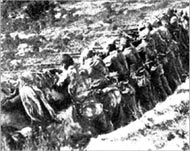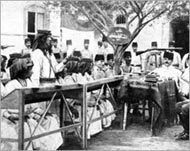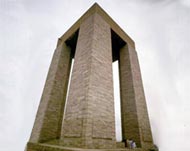The forgotten Arabs of Gallipoli
At a small but moving ceremony on 8 January, hundreds of Turks marked the 88th anniversary of the end of a famous first world war – Gallipoli.

Fought on a peninsula at the mouth of the Dardanelles Straits, this failed attempt by the British and French Empires to knock the Ottoman Empire out of the war and occupy Istanbul has gone down in history for its savagery and heroism.
The ceremony honoured a Turkish victory, not an Ottoman one, however – a fact some historians are now beginning to question, particularly as this version leaves out the important role of a major part of the Ottoman army – Arab soldiers.
“The Arabs are not mentioned much in the history,” says Selim Meric, a member of the historical society of the town of Eceabat, located close to the old battlefields.
“It is only in diaries of the time that you find reference to them. They have been forgotten.”
Disputed role
During the First World War, Arab troops fought on every front – in what are now Egypt, Syria, Israel, Palestine, Jordan, Saudi Arabia, and Iraq, as well as in eastern Turkey and Galatia.
 |
|
Arab soldiers served with Turks |
In Ottoman times, the government in Istanbul had a concerted policy of transferring Arab troops away from their native lands, deploying them in Anatolia. Meanwhile, Turks from Anatolia were often deployed in Arabian lands.
Nowadays, many Turks see the Arab role in the First World War only as one of betrayal, referring to the revolt in the Arabian Desert partly assisted by the British officer TE Lawrence.
However, historian Gurcel Goncu dismisses this “stab in the back” theory. “This is a cliché,” he says. “It is not about us being stabbed in the back, but about our shooting ourselves in the foot. The empire was a huge land with many different and varied cultures.”
Having lost the concept of that diversity, the Ottomans lost the loyalty of their subjects, he argues.
Significant battle
With an estimated 300,000 Arabs in the Ottoman forces in 1914, a third of the total men under arms, there were far more Arabs serving in the ranks of the Ottoman army than those who followed the banners of the Arab revolt, Goncu points out.
|
“Two thirds of the troops who made up his (colonel Mustafa Kemal) 19th Division that faced the first wave of the Allied invasion were Syrian Arabs, comprising the 72nd and 77th regiments of the Ottoman army” Bill Sellars, |
However, Gallipoli is now claimed as only a Turkish victory. It was there that Colonel Mustafa Kemal twice thwarted Allied attacks, saving an empire that he would then overthrow. Later, he was to become better known as Ataturk, the founder of modern Turkey.
Yet, historians now point out it was with the help of Arab troops that his reputation was built.
“Two thirds of the troops who made up his 19th Division that
faced the first wave of the Allied invasion were Syrian Arabs,
comprising the 72nd and 77th regiments of the Ottoman army,” says Turkey-based Australian writer and historian Bill Sellars.
The battle was highly significant for Australians too, as they made up an important part of the British imperial forces at Gallipoli. Their experience during the campaign – alongside New Zealanders, who together became known as the ANZACs – helped forge Australia’s own national identity.
Huge losses
In total, 52,000 men of the invading force were killed during the year-long campaign. An estimated 87,000 Ottoman troops died in the defence of the Gallipoli peninsula and the Dardanelles Strait, the strategic waterway that in part links the Aegean to the Black Sea.
 |
|
Ottoman officers went to Arabia |
Many of those who fell were Arabs, though as elsewhere, they were often unwilling recruits to the Ottoman colours.
An Australian airforce officer, Captain Thomas White, captured by the Ottomans in Iraq in 1915, wrote in his diary of conscripted Arab troops being brought in for training from the region near Mosul, where he was being held prisoner.
“Roped together by the shoulders and further secured in pairs with wooden handcuffs,” he wrote, “strings of footsore Arabs arrived to be trained; food for cannon on some distant front.”
They varied in age from mere boys to white-bearded patriarchs, rounded up from villages already depleted of horses, arms and food, and marched great distances by mounted gendarmes who drove them with whips like cattle.
“The survivors of this hard school, when sufficiently tractable, were armed with nondescript weapons, and given a course of recruit training that was as inefficient as it was ludicrous.”
No memorials
At least some of these survivors would have found unmarked graves on the Gallipoli Peninsula.
|
|
|
The main Turkish monument to |
The Turkish government recently agreed to the construction of a new series of memorials for the Gallipoli battlefields, with monuments to the separate Allied countries who served in the campaign, as well as adding more commemorative sites for their own troops.
Monuments are planned for the Ottoman’s German allies, along with the other nations that served with the British and French imperial forces such as Canada and Ireland.
However, the remembrance of both the vanquished and the victors will not extend to the Arab soldiers of the Ottoman Empire, lost in the rewriting of history.
Nowadays, walking among the few cemeteries established by the Turkish government on the battlefield, one comes across graves of men from Baghdad, Aleppo, Damascus and Makka.
They lie in a foreign country, each headstone marked by a flag that is not their own.
